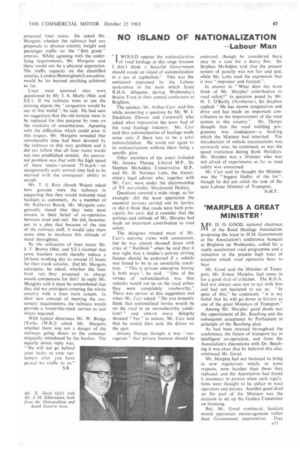NO ISLAND OF NATIONALIZATION
Page 49

If you've noticed an error in this article please click here to report it so we can fix it.
—Labour Man I
" WOULD oppose the nationalization
of road haulage at this stage because I don't think a Socialist Government should create an island of nationalization in a sea of capitalism." This was the sentiment expressed by the Labour spokesman in the team which faced R.H.A. delegates during Wednesday's Brains Trust at their annual conference at Brighton.
The speaker, Mr. Arthur Carr, said this while answering a question by Mr. W. I. Duckham (Devon and Cornwall) who asked what impression the team had of the road haulage industry. Mr. Carr said that nationalization of haulage made sense only if there was to he a total nationalization. He could not agree to its nationalization without there being a specific plan.
Other members of the panel included Mr. Jeremy Thorpe, Liberal M.P.. Sir Stephen McAdden, Conservative M.P.. and Mr. H. Norman Letts, the Association's legal adviser who, together with Mr. Carr, were under the chairmanship of TV personality Macdonald Hobley.
Questions covered a wide range, as for example: did the team appreciate the essential services carried out by lorries. or did it think that roads were built principally for cars: did it consider that the policies and attitude of Mr. Marples had made an important contribution to road safety.
The delegates treated most of Mr. Carr's extreme views with amusement, but he was almost shouted down with cries of " Rubbish" when he said that it was right that a haulier's private driving licence should be endorsed if a vehicle was found to be in an unsuitable condi tion. This is private enterprise having it both ways", he said. "One of the virtues of nationalization was that vehicles would not be on the road unless they were completely roadworthy." There was uproar at this suggestion and when Mr. Carr asked: " Do you honestly think that nationalized lorries would be on the road in an unroadworthy condition?" and almost every delegate shouted "Yes" in unison, Mr. Carr said that he would then sack the driver on the spot.
Jeremy Thorpe thought it was outrageous" that private licences should be endorsed, though he considered there may be a case for a heavy fine. Sir Stephen MeAdden said that the present system of penalty was not fair and just, while Mr. Letts used the expression that it was "improper and farcical ".
In answer to "What does the team think of Mr. Marples' contribution to road safety?" (a question posed by Mr. N. T. O'Reilly (Northern)), Sir Stephen replied: "He has shown imagination and drive and has made an important contribution to the improvement of the road system in this country ". Mr. Thorpe thought that the road building programme was inadequate—a backlog which the Minister had inherited. The introduction of vehicle examinations was extremely wise, he continued, as was the speed restriction during Bank Holidays. Mr. Marples was a Minister who was not afraid of experiments so far as road safety was concerned.
Mr. Carr said he thought the Minister was the " biggest bluffer of the lot", though he did not relish the task of the .next Labour Minister of Transport.
N.H.T.




























































































